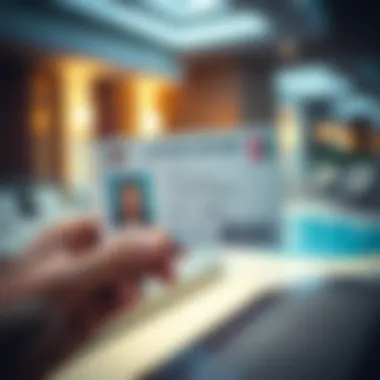Understanding the Emirates ID Acquisition Timeline


Intro
Acquiring an Emirates ID is more than just obtaining a piece of plastic; it signifies your integration into the vibrant tapestry of life in Dubai. This document serves as a key to the myriad of opportunities in both the professional and personal spheres, particularly in the fast-paced real estate market. For expatriates and investors alike, understanding the timeline and the process of securing this ID is crucial for making well-informed choices, especially when navigating property investments where a valid Emirates ID might be a requirement.
The journey to obtaining an Emirates ID involves various steps, and it's not without its intricacies. From the initial application through to the final approval, each stage comes with its own timelines, requirements, and potential hurdles. In this article, we will break down this process, address common questions, and highlight relevant aspects tailored for those looking to engage deeply with the Dubai property sector.
Market Trends and Analysis
When discussing the Emirates ID, it’s essential to consider the market conditions that influence its importance in real estate. An Emirates ID is not only a formal identification; it often serves as a critical document required for purchasing property, signing leases, or even securing financing options.
Current Market Conditions
As of now, the Dubai real estate market is witnessing a remarkable resurgence post-pandemic. Demand for residential properties is rising, with various segments like luxury apartments and villas getting particular attention. This uptick is largely fuelled by expatriates relocating to Dubai in search of better living conditions, work opportunities, and a favorable lifestyle. The government has also introduced various incentive programs that attract foreign investment. However, to tap into these opportunities efficiently, one must truly grasp how the Emirates ID process interrelates with overall market dynamics.
A current trend is the growing interest in off-plan projects. Many expatriates are now buying properties at pre-construction prices, which often require serious commitments like presenting an Emirates ID to finalise various transactions. Thus, having this identity document can offer a competitive edge in being able to make quick, informed decisions.
Future Predictions and Growth Areas
Looking ahead, analysts suggest that the Dubai real estate market will remain robust, with several growth areas emerging. The Expo 2020’s legacy is expected to continue fuelling demand as new projects come on-stream in areas around the Dubai South and your opportunity zones. Furthermore, with remote working becoming more mainstream, we might see a shift in interest towards suburban properties that offer more space.
Investors who delay securing their Emirates ID may find themselves missing out on lucrative deals, especially in the swiftly evolving landscape.
"In today's real estate market, timing is crucial; having the Emirates ID can mean the difference between securing a prime property or watching it slip through your fingers."
Property Investment Strategies
To navigate the vibrant property market efficiently, a solid strategy is fundamentally necessary. This often ties back to the role of the Emirates ID, which can determine how quickly and efficiently you can engage in real estate transactions.
Types of Properties to Consider
Real estate in Dubai offers a plethora of options ranging from lavish villas in Palm Jumeirah to trendy apartments in Downtown Dubai. When you have your Emirates ID, it opens doors across the entire spectrum of real estate types:
- Luxury Villas: Catering to affluent expatriates, these properties often come with premium amenities and views.
- Apartments: Perfect for single professionals or small families, they offer flexibility and accessibility to city life.
- Off-Plan Developments: These properties can provide significant returns, but require pre-purchase engagement confirmed by an Emirates ID.
Financing Options and Considerations
Having an Emirates ID also plays a pivotal role in exploring financial products available through various banks and financial institutions. A local ID often simplifies processes related to:
- Mortgages: Which are essential for those looking to buy property rather than rent.
- Loans for Investment: Access to funds for further investment opportunities.
Overall, the sooner you secure your Emirates ID, the better prepared you'll be to capitalize on opportunities present in the Dubai property market.
Prologue to Emirates
In the bustling and ever-evolving landscape of Dubai, the Emirates ID stands as a crucial cornerstone for both residents and newcomers. This identification card is more than just a piece of plastic; it serves as an essential gateway to a myriad of services and opportunities. From legal residency to simple everyday transactions, the Emirates ID has become synonymous with identity verification in the United Arab Emirates.
The importance of the Emirates ID ignites discussions about security and accessibility in the UAE's vibrant community. It acts as a legal status indicator and signals one's right to reside and operate within the emirate. For expatriates, possessing an Emirates ID can streamline processes, whether securing a residential lease or engaging in commercial ventures.
On a practical level, the Emirates ID is vital for accessing various services, like healthcare, education, and even banking. Residents find themselves requiring this ID for a multitude of tasks, effectively intertwining it with daily life in Dubai. Notably, the Emirates ID plays a pivotal role in the property sector; investors, homeowners, and real estate agents find it indispensable when navigating the dynamic real estate landscape.
Obtaining this ID is undoubtedly a journey. The procedures involved, required documentation, and the timelines can appear daunting, particularly for new arrivals. However, comprehensively understanding the process is the first step toward a seamless experience.
In this article, we aim to break down this journey. We will explore the essential steps required to obtain your Emirates ID, the differing timelines, and the various factors that can influence the process. Highlights will include the importance of thorough documentation and awareness of potential delays.
Ultimately, navigating the complexities of obtaining an Emirates ID will render it less of an obstacle and more of an opportunity—a chance to immerse oneself fully in the rich tapestry of life in Dubai. Through this understanding, both expatriates and investors will find themselves equipped with the knowledge necessary to thrive in this vibrant market.
Remember: The Emirates ID is not merely an ID card. It's a key to unlocking a world of opportunity in the UAE.
With that in mind, let’s dive deeper into the significance of the Emirates ID and its indispensable role in the frame of Dubai's real estate and administrative landscape.
Importance of Emirates in Dubai
The Emirates ID holds significant value in Dubai, functioning not just as a form of identification but as an essential asset for participating in various aspects of life in the UAE. Its importance extends to legal status, access to vital services, and a multitude of everyday conveniences, making it crucial for expatriates and locals alike to understand its purpose beyond mere bureaucracy.
Legal Status and Residency
First and foremost, the Emirates ID symbolizes your legal status in the UAE. For expats, it's a confirmation of residency, signifying that you are authorized to live and work in the country. Without this card, navigating daily life can become a formidable challenge; for instance, landlords often require a valid Emirates ID before signing any leases. Moreover, engaging in legal contracts or fulfilling obligations such as opening a bank account necessitates this identification.
It is not just about having the card. The process of obtaining it typically ties back to one's visa status, meaning any issues with your visa status could also impact your Emirates ID.
The law is clear: every resident, whether Emirati or foreign, must hold this identification. It acts as a bridge, connecting the individuals to the myriad of resources and services available, fostering a sense of security in their residency status. If you’re planning to build roots in Dubai, skipping the Emirates ID can be like trying to drive a car without a steering wheel—simply not possible.
Access to Services
In the bustling metropolis of Dubai, having an Emirates ID unlocks a treasure trove of services and conveniences that are pivotal for both your day-to-day life and your long-term plans.


- Healthcare: Accessing medical services is seamless with your Emirates ID. You cannot book appointments or even receive treatments in most governmental health facilities without it.
- Utilities: Want to set up water, electricity, or internet services? Your Emirates ID is the ticket in. Utility providers need it to verify your identity before they can establish any services under your name.
- Education: If you have children, enrolling them in schools or nurseries requires an Emirates ID. This often forms part of the admission process, and it's an important document to have at hand.
- Transportation: Whether it’s public transport or vehicles, your Emirates ID is often a necessity for application processes or to receive discounted fares as a resident.
As you can see, the Emirates ID not only represents legal identity but serves as a multi-functional tool that eases entry into various scenarios. Much like a Swiss Army knife, it’s handy in a myriad of situations, making life in Dubai smoother and more manageable.
Having your Emirates ID on hand is not just a bureaucratic necessity – it’s a lifeline in navigating both the simple and complex aspects of living in Dubai.
In short, the significance of the Emirates ID cannot be overstated. By securing this vital document, you’re not just fulfilling a legal obligation; you’re paving the way for a hassle-free existence in an ever-evolving city that thrives on innovation, diversity, and opportunity.
Step-by-Step Procedure to Apply for Emirates
When you think about living in Dubai, securing an Emirates ID can feel like jumping through a bunch of hoops. But it’s more essential than just a piece of plastic; it's your golden ticket to thrive in the UAE. Not only does this ID serve as proof of your identity and residency, but it also opens the door to numerous services—like banking and healthcare. Now, understanding the process and how to go about it is crucial for expatriates, property investors, and anyone eager to settle into the city. Let's break it down step-by-step, so you’re not left scratching your head about what to do next.
Online Application Process
In this digital age, applying for your Emirates ID online is as easy as pie. The authorities have streamlined the system to save you time and effort. To kick things off, you’ll want to visit the official government portal—usually the Federal Authority for Identity and Citizenship website. Here’s how you can get started:
- Create an Account: Sign up with necessary personal details. Ensure your information is accurate; a simple typo could lead you down the wrong path.
- Fill Out the Application Form: Complete the online application form. This includes providing your personal info, residency status, and contact information. It’s crucial to double-check that everything is airtight.
- Upload Required Documents: You’ll need to scan and upload essential documents such as your passport, residency visa, and maybe even a passport-sized photo. Make sure these documents are clear and legible.
- Payment: Once your documents are in, proceed to the payment section. Use a valid method—credit card or local bank transfer is usually accepted. Keep the receipt handy; you might need it later.
- Submit: After confirming that all details are correct, hit that submit button.
- Track Your Application: The platform allows you to track your application’s status. It’s wise not to let this slide; you’ll be able to catch any issues promptly.
Completing the online application is typically faster than the in-person route, assuming you have all your ducks in a row. But keep in mind that glitches do happen, and it’s not unusual for applicants to encounter minor delays.
In-Person Application Process
If the online world gives you the heebie-jeebies, then opting for an in-person application may suit you better. Many folks prefer this because they can clarify doubts and establish a more personal connection with the officials. Here’s how you can nail the in-person application:
- Visit a Nearby Service Center: Locate the nearest typing center or the ICA office. Check their working hours before you head out—no one likes a wasted trip!
- Bring All Required Documents: It’s not just about having the right forms; you’ll need your passport, residency visa, and photos. Get these sorted before you walk out; otherwise, you’ll be heading back home in a huff.
- Fill Out the Application Form: You can get help from the staff if you need to. They’ll assist with any confusing parts of the form, making it simpler for you.
- Submit Your Application: Hand in the form, along with the documents. Make sure that you double-check everything one more time before submitting.
- Payment Process: Once you’ve submitted your application, you’ll also pay the associated fees at the reception. Keep that receipt like it’s your lifeline.
- Await Confirmation: After the submission, you’ll receive a confirmation slip. Hold onto it; it’s your ticket to further updates on your application’s status.
While the in-person route can be more reassuring, do be prepared for potential waiting times. Facilities can be a bit crowded, and you might find yourself twiddling your thumbs for a while.
Getting your Emirates ID, whether online or in person, means opening up a world of possibilities in Dubai. It’s more than a mere ID; it’s the key to integrating into UAE society smoothly.
Navigating these steps carefully will lay the groundwork for concrete estate investments or any long-term plans in Dubai. Whether you are a seasoned expat or a new resident looking to settle down, taking the time to understand the procedure ensures you are one step closer to calling Dubai home.
Required Documents for Emirates Application
Obtaining an Emirates ID is a pivotal step for anyone residing or planning to engage in activities in Dubai. The process isn’t just about filling out a form and submitting it; it involves a careful compilation of essential documents that reflect your identity and residency status. This section highlights the required documents for obtaining an Emirates ID, emphasizing their importance for a smooth application process.
Personal Identification
Personal identification serves as the cornerstone of your Emirates ID application. This is proof that you are who you say you are. Typically, you'll need to submit a government-issued identity document. This could be a passport or a national ID card from your home country. The vital aspect to emphasize here is the accuracy of the details provided.
When submitting these documents, ensure that:
- Name is spelled correctly, matching exactly with your passport or home ID.
- Birth date is accurate, as discrepancies can lead to unnecessary delays.
Missing or erroneous details could lead to your application being flagged, causing back-and-forth with the government officials. It's also smart to have photocopies of these documents handy. This detail might seem small, but you’d be surprised how often it saves applicants from a lot of heartache and headaches.
Residency Documents
Residency documents are equally crucial because they establish your lawful presence in the UAE. The requirements for these can vary based on your status, like whether you’re an expatriate worker or a resident investor. Generally, you'll need your residency visa or a lease agreement as proof of where you live.
For expatriates, here are key documents to have:
- Residency Visa: This document must be valid and reflect your current status in the UAE. Make sure it is recent.
- Emirates residency medical examination results: This is particularly essential for those applying for the first time.
For residents looking to secure or renew their Emirates ID, it’s crucial to ensure all documents are up-to-date. A simple slip-up could lead to delays or rejections. Additionally, understanding the requirements from the start can help sidestep issues down the line.
Always double-check the specific requirements on the official government websites or consult trusted resources linked below.
For further guidance, you may refer to the following resources:
Each document’s importance cannot be overstated. Ensuring that you have all the requisite identification and residency papers organized and ready to go can significantly smooth out the application process, adding a layer of assurance to your journey in acquiring an Emirates ID.
Typical Processing Times for Emirates
Understanding the timeline involved in obtaining an Emirates ID is paramount for anyone looking to reside, work, or invest in Dubai. The processing times can vary significantly depending on several factors, which makes it essential for aspiring expatriates, homeowners, and investors to grasp what they are up against. Knowing these timelines allows for informed planning and helps avoid unnecessary stress throughout the application process.
In the fast-paced environment of Dubai’s property market, time is money. Delays in getting an Emirates ID can hinder property transactions, affect rental agreements, and create ripple effects on personal arrangements. Therefore, this section sheds light on the typical time frames expected when applying for an Emirates ID through standard and expedited methods.
Standard Processing Duration
The standard processing time for an Emirates ID application generally falls between one to two weeks after submission. However, factors such as holiday seasons, administrative loads, and the completeness of the application documents can cause fluctuations. It’s akin to waiting for a kettle to boil, where patience sometimes yields unexpected delays.
Some key points to consider regarding the standard duration include:
- Days of Submission: Applications submitted during weekends or holidays may experience additional delays due to non-operational government offices.
- Document Completeness: Any missing documentation can prompt further investigation, elongating the wait time.


In essence, while official guidelines suggest a two-week wait, applicants should be prepared for the possibility of it taking longer, especially during peak submission periods. This variability underscores the importance of ensuring that all required documents are meticulously prepared ahead of time.
Expedited Processing Options
For those pressed for time, expedited processing options are available, allowing applicants to receive their Emirates ID within 1 to 3 days. This fast-track service is particularly beneficial for urgent transactions, such as property purchases or immediate employment needs.
- Eligibility: To qualify for expedited services, applicants usually need to pay an additional fee and may need to present evidence of urgency, such as an employment offer letter or property commitments.
- Cost Consideration: Although faster, this option is typically more expensive compared to the standard processing route. Evaluating whether the cost outweighs the benefit of immediate access can be a deciding factor for many.
"Understanding the timing of your Emirates ID processing is essential to mastering the nuances of property dealings in Dubai."
Factors Affecting Application Duration
When embarking on the journey to obtain an Emirates ID, it's crucial to understand that various factors influence how long the entire process may take. Whether you are a first-time applicant or renewing your existing ID, awareness of these contributing elements can lead to a smoother application experience. Here, we will explore two key aspects — the completeness of your application and potential government processing delays — that can significantly impact the timeline of your Emirates ID procurement.
Application Completeness
Ensuring that your application is complete is paramount to avoiding unnecessary delays. A well-rounded application includes all required documentation and accurate information. Here are some important points to consider:
- Document Accuracy: This includes your personal identification and residency documents. Mismatched names or incorrect details can halt the application process mid-stream.
- Fulfillment of Requirements: The Emirates ID application process demands that specific documents be provided, such as a valid passport, residency visa, and personal photographs. Missing even one of these can lead to immediate rejection.
- Organized Submission: Submitting documents in an orderly fashion and correctly labeled can expedite the review process as officials can quickly assess your application. An unorganized submission might delay proceedings as officials may need to sort through the paperwork.
In summary, the completeness of your application directly correlates with the speed at which it is processed. Lack of thoroughness can lead to delays that could span several weeks, hindering your access to various services in the UAE.
Government Processing Backlogs
Another significant factor that can impact the timeline for receiving your Emirates ID is the possibility of government processing backlogs. This is particularly relevant during busy seasons, such as public holidays or peak migration periods. Understanding these nuances can help you plan accordingly.
- High Volume Applications: Certain times of the year, like the beginning of the academic year or after major holidays, see an influx of applications. This surge can overwhelm processing centers, causing delays.
- System Maintenance and Upgrades: Government agencies periodically conduct system upgrades or maintenance that can result in temporary slowdowns in processing speed. If you're aware of such schedules, you can avoid submitting your application during those windows.
- Regional Differences: Processing times might also differ based on your location in the UAE. Some regions may experience longer wait times than others due to resource allocation or staffing levels.
"Awareness of government processing timelines adds a layer of strategy to obtaining your Emirates ID. Plan ahead to avoid extra lag."
By keeping these factors in mind, applicants can navigate their Emirates ID application with greater finesse, addressing potential issues before they become roadblocks in an otherwise straightforward process. The key is preparation and awareness — knowing when to submit your application can make all the difference.
Common Challenges in Obtaining an Emirates
Acquiring an Emirates ID isn't just a walk in the park. While many think it’s a straightforward process, there are several hurdles that applicants typically face. Understanding these challenges can ease the journey for expatriates, investors, and anyone keen on navigating Dubai’s real estate market. The importance of recognizing these common challenges is significant; it not only allows for better preparation but also helps avoid unnecessary delays that can impact personal and professional endeavors.
Documentation Issues
Documentation serves as the backbone of the Emirates ID application process. Every applicant must ensure that all documents are accurate and up to date. Often, mistakes in your papers can lead to significant delays. For instance, a simple typo in your name or an outdated residency visa can throw a wrench into the works. Let’s dive into what typically goes wrong:
- Missing Documents: Applicants often overlook certain required documents. This might include attested educational certificates or proof of residency that are essential to verify your identity. Without these, the application can stall.
- Outdated Information: If you're changing your marital status or relocating to a new address, it's crucial to update your documents beforehand. Not doing so can lead to rejected applications or requests for additional paperwork, dragging out the process.
- Inconsistent Information: Any inconsistency between the documents submitted and the information provided in the application can trigger red flags. For instance, if your passport has your name listed differently than your residency visa, the authorities will not let that slide.
Addressing these documentation issues beforehand can significantly smooth the path to obtaining your Emirates ID, making it essential to double-check every aspect of your submission.
Delays Due to Errors
Errors, no matter how small, can have a cascading effect on the timeline for receiving your Emirates ID. From data entry mistakes to misinterpretations of your documents, the risks are aplenty. Let's explore some common errors that can lead to frustrating delays:
- Data Entry Mistakes: When applying online, human errors—like entering the wrong date of birth or misspelling your name—can occur. Once submitted, correcting such errors usually involves additional steps and waiting periods, which only compounds your frustration.
- Miscommunication with Authorities: Sometimes applications are processed by individuals who may misinterpret your submitted information or miss a requested document entirely. This can lead to unnecessary hold-ups as you scramble to rectify the situation.
As highlighted, having a keen eye on details and ensuring rigorous checks can mitigate many of these delays.
In short, being proactive about documentation and errors can save time and prevent headaches during the Emirates ID application process.
Navigating these common challenges doesn’t have to feel like an uphill battle. By staying organized and informed, potential hurdles can be tackled effectively, setting the stage for a successful application process.
Post-Application Steps
The completion of your Emirates ID application is only the beginning of a journey. After submitting your application, it's crucial to understand the post-application steps necessary for a smooth transition to full residency status. These steps not only ensure that you receive the Emirates ID promptly but also help you settle down in the UAE with ease. Comprehending these processes means you can tackle the associated follow-ups without any added hassle.
Receiving the Emirates
Once your application is approved, awaiting the arrival of your Emirates ID can cause a stir of emotion—excitement mixed with anticipation. Typically, the Emirates Authority for Identity and Citizenship aims to dispatch the IDs promptly, usually within a few days after the application approval. Keep an eye on your registered email or message notifications, as updates often arrive there first. You may also receive instructions on how to track your Emirates ID.
When it finally arrives, ensure you check all the details thoroughly. Spelling errors on your name or wrong dates can lead to complications later on. If you spot any discrepancies, it’s better to address them right away. The best contact point for resolution would be directly through the relevant customer service channels or their official website. Receiving your Emirates ID is more than just a piece of identification; it’s your pass into a multitude of opportunities in the UAE—from employment to property transactions.
Updating Personal Records
Now that you possess your Emirates ID, the next step involves updating your personal records. This might sound a bit tedious, but it’s worth doing to avoid any friction down the line, especially if you’re dealing in real estate. Think of it as a way to align every aspect of your life in the UAE.
Firstly, it's important to make sure that your Emirates ID is linked to your various accounts. This includes banking institutions, healthcare facilities, and utility providers. These organizations generally require your Emirates ID details for accurate record-keeping. If you’re renting a property or have purchased one, updating your records with the landlord or property management demonstrates your compliance and can even add to your credibility as a tenant or homeowner.
Additionally, if you've changed your marital status or relocated within the UAE, these changes need to be reflected in your Emirates ID records, as they can influence several legal matters, including your eligibility for certain services or benefits. Keep documents like marriage certificates or utility bills handy, as they often come in handy when making these updates.
In one seasoned expat's words, "Updating my records was one of those essential tasks I put off, thinking it could wait. In reality, it made everything else a breeze!" Taking these post-application steps seriously ensures you stay on top of your professional and personal life in the UAE.


"Your Emirates ID is not merely an identification; it's a gateway to thriving in the UAE's dynamic landscape."
By following these steps, you can secure your status and take full advantage of the myriad opportunities available in Dubai's vibrant property market.
Impact of Emirates on Property Transactions
Emirates ID plays a pivotal role in the realm of property transactions in Dubai. It serves not only as a primary identification document but also as a crucial tool that wraps around various legal and administrative processes related to real estate. Without it, engaging in property matters can often feel like sailing without a compass—confusing and fraught with potential difficulties.
Requirements for Home Buyers
For those looking to invest in property, having an Emirates ID is a non-negotiable prerequisite. Specifically, potential home buyers must understand the following key requirements associated with their Emirates ID:
- Proof of Identity: The Emirates ID is your ticket to proving your identity beyond any shadow of a doubt. It allows financial institutions and property developers to verify you as a legitimate buyer.
- Access to Mortgage Facilities: Banks and financial institutions require a clear and valid Emirates ID to process mortgage applications. Without this card, obtaining financing may be significantly delayed or even impossible.
- Legal Compliance in Transactions: In the eyes of the law, your Emirates ID substantiates your eligibility to engage in buying transactions. It ensures compliance with local regulations, preventing any legal hiccups in the process.
- Official Contracts and Agreements: Transactions require signed agreements, and all contracts necessitate a valid Emirates ID. This includes purchase contracts, rental agreements, and agreements with real estate agents.
Rental Agreements and Emirates
When it comes to renting property, the Emirates ID also holds great significance. The implications extend from landlords to tenants:
- Tenancy Contracts: A rental agreement without the tenant’s Emirates ID is akin to a ship without sails. It simply won’t move forward. The ID must be presented to formalize any tenancy contracts, which provides legal protection to both parties involved.
- Utilities Registration: To set up utility services, such as water and electricity, providing your Emirates ID is necessary. This not only streamlines the process but also helps in avoiding misunderstandings regarding service initiation.
- Legal Rights as a Tenant: Possessing an Emirates ID grants tenants the legal backing they need in case of disputes or issues with the property. It becomes a essential element in advocating for one’s rights as dictated by local laws.
Emirates Renewal Process
Renewing your Emirates ID is a process that, while straightforward, carries significant importance for residents and expatriates in the UAE. The Emirates ID is not just a piece of plastic; it's a key to accessing services, securing your residency status, and even facilitating property transactions in Dubai’s bustling real estate market. Understanding the renewal process can save you headaches down the road, especially if you’re navigating legal requirements or looking to make major investments.
When your Emirates ID nears its expiration date, it becomes crucial to kick off the renewal process promptly. A lapse can lead to unnecessary penalties and complications, affecting everything from employment to the legitimacy of your residency status.
Timeline for Renewal
The timeline for renewing your Emirates ID typically ranges from one week to about ten business days, depending on various factors such as the completeness of your application and current processing times at the Federal Authority for Identity and Citizenship (FAIC). It’s wise to begin the renewal process at least a month before the expiration date of your ID to avoid any last-minute hitches. Here’s a brief outline of what to expect:
- Week 1: Prepare your documentation and submit your renewal application, either online or in person.
- Days 2-7: FAIC reviews your application. This includes verifying your submitted documents and ensuring that everything is in order.
- Day 8-10: If everything checks out, your new Emirates ID will be processed and ready for collection or delivery.
However, one must keep in mind that unexpected delays can occur due to backlogs or during peak times, especially around holidays. Also, make sure to receive a confirmation message after submitting your application; this will help you track your application status.
Documents Required for Renewal
When it comes to documents required for the renewal of your Emirates ID, being prepared is half the battle. Make sure you have the following documents ready:
- Current Emirates ID: This is the most crucial document as you’ll need to present this for verification.
- Passport: Ensure your passport is up-to-date as it is required for identity verification.
- Residency Visa: This should still be valid and clearly indicate your current residency status in the UAE.
In certain cases, you may also need to provide additional documents relating to your status, especially if there have been changes since your last application.
"Staying on top of your Emirates ID renewal can mean the difference between smooth sailing and running aground in the busy waters of Dubai’s bureaucracy."
By having your documents organized and adhering to the timeline for renewal, you set yourself up for a hassle-free experience, allowing you to focus on what truly matters, whether that’s securing a property, running a business, or simply enjoying life in this vibrant city.
Questions and Answerss About Emirates Timeline
When navigating the process of obtaining an Emirates ID, it’s essential to clarify some common queries that many applicants have. These frequently asked questions not only illuminate the timeline involved but also help set realistic expectations. A solid grasp of this timeline enhances your readiness and ensures you are well-prepared to tackle the challenges involved.
Understanding the process isn't just about timing; it’s also about insuring that your application moves smoothly through the necessary channels, and that you're aware of potential delays or hurdles.
How Long Should Expect to Wait?
Anticipating the waiting period for your Emirates ID application can make a world of difference. Generally, the processing time is roughly two to three weeks from the moment your application is submitted—assuming all documents are in order. However, this window can stretch depending on various factors, such as:
- Application Completeness: If any required paperwork is missing, or documents aren’t correctly filled out, this can delay assessment significantly.
- Government Processing Backlogs: Sometimes, a sudden influx of applications can cause delays. During peak periods, such as holidays, expect longer waiting times.
It’s wise to bear in mind that some applicants might receive their Emirates ID earlier than anticipated—although it’s better to plan for the full duration to avoid any inconveniences.
What If My Application is Delayed?
In the unfortunate event that your Emirates ID application runs into a delay, there are a few steps you can take. First and foremost, patience is key; however, it’s also essential to be proactive. Here are the options to explore if your application is lagging:
- Check Status Online: Visit the official website of the Federal Authority for Identity and Citizenship to check your application status. This often gives insight into why there might be a hold-up.
- Contact Customer Service: When in doubt, reaching out for help is always a sound strategy. They can provide specific details regarding your application.
- Review Your Submission: Ensure you have provided all necessary documentation. Sometimes a simple error might derail the entire process. Learn from any existing mistakes.
"Being informed is half the battle; knowledge of the Emirates ID timeline can facilitate your journey in Dubai's property landscape.”
Epilogue
Various elements play into the overall timeline, including application completeness, processing efficiencies, and external factors such as government backlogs. It's crucial to gather all required documents, ensuring nothing is amiss to avoid any unnecessary holdups. Effective preparation can save applicants from the frustration associated with delays. Additionally, being aware of expedited options can provide a lifeline to those in urgent need of their Emirates ID.
The benefits of having a clear understanding of this timeline extend beyond merely receiving the ID. For expatriates, it allows for smoother integration into the socio-economic fabric of Dubai. For real estate investors, having an Emirates ID is foundational, influencing various aspects from purchasing property to facilitating rental agreements. Hence, this knowledge equips individuals with the confidence to plan effectively, ensuring they can seize opportunities as they arise.
"With the right information and planning, the process can transform from a daunting task into a manageable journey."
Ultimately, engaging with the timeline effectively is not simply about crossing off a checklist; it’s an essential part of establishing a stable presence in one of the world's most dynamic markets. In summary, a proactive approach, understanding the intricacies, and being prepared can lead to a far smoother experience in acquiring an Emirates ID—benefiting both personal and professional pursuits in Dubai's bustling environment.
Summary of Key Points
- Importance of Timeliness: Understanding the timeline aids in effective planning for both expatriates and investors.
- Factors Influencing Duration: Application completeness and government backlogs can significantly impact processing times.
- Preparation is Key: Securing all necessary documentation upfront can prevent delays.
- Expedited Options: Awareness of faster processing methods can be beneficial for urgent needs.
- Impact on Life in Dubai: An Emirates ID is crucial for integrating into Dubai, impacting real estate transactions and daily activities.











